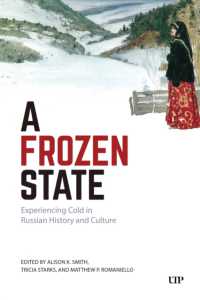- ホーム
- > 洋書
- > 英文書
- > Literary Criticism
Full Description
Shows German Science Fiction's connections with utopian thought, and how it attempts Zukunftsbewältigung: coping with an uncertain but also unwritten future.
Since its beginnings, German Science Fiction (or SF) has engaged with social change and technological progress, often drawing from utopian thought. The writer Kurd Laßwitz challenged the authoritarian Wilhelmine order; later, film director Fritz Lang provided a searing critique of Weimar society. Meanwhile utopian thinkers like Ernst Bloch and Herbert Marcuse insisted on the possibility of hope, even in the face of totalitarianism. During the Cold War, German utopian writing and filmmaking were vital both as a warning and as a creative imagining of possible futures. More recently, as rapid scientific and technological advances have continued, literary and cinematic responses have become increasingly dystopian in outlook, reflecting fears connected with globalization, advances in artificial intelligence and genetic engineering, and persistent challenges like climate change, hunger, migration, and terrorism.
This book explores German SF's responses to the question how humanity can match technological advances with social, ethical, and moral progress. It surveys German utopian thought and the German SF tradition-both literary and cinematic-providing close readings of selected works that paradoxically reflect boundless optimism for the possibility of change and increasing pessimism in its likelihood. English translations are provided throughout. Building on its rich tradition but now confidently entering the mainstream, German SF attempts Zukunftsbewältigung: coping with an uncertain but also unwritten future.
Contents
Note on the Translations
Acknowledgments
Introduction
Part I.The Great Discourse on the Future
Utopians and Utopian Thought
Futurists and Futures Studies
Utopian/Dystopian Writers and Utopian/Dystopian Fiction
Science Fiction: The Nexus of Utopianism, Futurism, and Utopian Fiction
Part II. German Science Fiction in the Twentieth and Twenty-First Centuries
Some Preliminary Thoughts on German Science Fiction
First Contact: Martians, Sentient Plants, and Swarm Intelligences
The Shock of the New: Mega Cities, Machines, and Rockets
Utopian Experiments: Island Idylls, Glass Beads, and Eugenic Nightmares
To the Stars!: Cosmic Supermen and Bauhaus in Space
Visions of the End: Catastrophism and Moral Entropy
Virtual Realities: Caught in the Matrix
Alternative Histories: Into the Heart of Darkness
Big Brother is Watching Us: Who is Watching Big Brother?
Artificial Intelligences: The Rise of the Thinking Machines
Eternal Life: At What Cost?
Social Satires: Of Empty Slogans and Empty Hearts
Critical Posthumanism: Twilight of the Species or a New Dawn?
High Concept: Time, the Universe, and Everything
Conclusion
Appendix 1: Chronological List of German SF Novels-A Selection
Appendix 2: Chronological List of German SF Films-A Selection
Notes
Bibliography
Index





